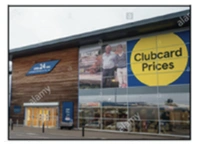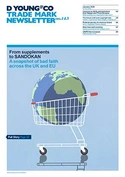A “Lidl” victory: Tesco and Lidl battle it out over bad faith and survey evidence
The budget supermarket, Lidl, recently succeeded in having Tesco’s bad faith counterclaim struck out, and was permitted to have survey evidence introduced at trial, to assist with the issue of distinctiveness of Lidl’s registered trade marks.
The claim
German discount retailer Lidl, operating in Europe and the US, owns various registered trade marks for two versions of its logo; a graphical device consisting of a yellow circle with a red rim on a blue background (the wordless mark) and the graphical device with the word “Lidl” in blue with a red letter “I” on a yellow circle with a red rim on a blue background, as depicted below (the mark with text).

British multinational supermarket Tesco has recently used a yellow circle on a blue background with the words “CLUBCARD PRICES”, to promote its discounted prices for its loyalty “clubcard” members (the sign).

Lidl alleged that Tesco’s use of the sign amounted to trade mark infringement of its wordless mark and its mark with text.
Lidl accepted that the wordless mark had not been used on its own in the UK, however, it argued that its use in conjunction with the mark with text meant that it was recognised as being distinctive of Lidl’s business. Therefore, it had a reputation in the UK and Tesco’s use of the sign was taking unfair advantage of this reputation contrary to section 10(3) Trade Marks Act 1994.
The counterclaim
Tesco counterclaimed to invalidate Lidl’s wordless mark. It claimed that the trade mark had been registered in bad faith as Lidl had no intention of using the mark, and that its sole purpose was to be used as a “legal weapon” in proceedings. Tesco also accused Lidl of “evergreening” by filing duplicative trade mark applications for the wordless mark.
The applications
Lidl applied to the High Court to have the bad faith counterclaim struck out or, alternatively, for summary judgment. The court needed to establish that there were no reasonable grounds for bringing the claim and that it was bound to fail.
Lidl also requested permission to rely on survey evidence to prove the mark’s distinctiveness.
Decision: bad faith
Tesco argued that Lidl had never used nor intended to use the wordless mark and that its only use of it was in conjunction with the mark with text. The judge referred to the earlier Specsavers International Healthcare Ltd v Asda Stores case, which had already established that there was nothing wrong with owning overlapping trade mark registrations or protecting the background of a logo.
The judge was not convinced that by registering the wordless mark without intent to use, or registering it and not using it, or registering it and not knowing what use will be made of it, were sufficient grounds to defeat the presumption of good faith. An allegation of bad faith is a serious allegation which must be proved distinctly. The behaviour must be one that falls short of what can be regarded as acceptable commercial behaviour.
Similarly, Tesco’s allegation of evergreening was found to be insufficient to rebut the presumption of good faith. It was found that Lidl had applied to re-register the wordless mark on its own commercial rationale, with each registration either covering a wider specification, wider territories, or reflecting the evolution of the logo. The mere re-registration was not in itself indicative of bad faith as there must be an intent to circumvent trade mark law in relation to proof of use requirements, which was not evidenced in Tesco’s arguments.
Overall, the judge was not convinced that Tesco had done enough to rebut the presumption of good faith. There was no proof that the sole objective when applying to register the wordless mark was anything but for the essential functions of a trade mark. Therefore, the application to strike out the counterclaim was granted.
Survey evidence
Lidl had applied for permission to rely on survey evidence at trial, which had already been conducted. The survey was composed of three questions, each of which invited the consumer to look at an image of the wordless mark and answer the following questions:
- What do you think this image is?
- Now, please imagine that this image was used as a company’s brand…Which company would you expect it to be?
- Now, please imagine that you saw this image in or around a supermarket…Which supermarket would you expect it to be?
Tesco objected to the admissibility of the survey. First, it claimed that the survey had used the wrong stimulus and had been conducted under artificial circumstances. Lidl should not have shown the wordless mark to participants since they would not have come across it in the real world. Second, Tesco claimed that the survey evidence was insufficient to demonstrate acquired distinctiveness. The judge was not convinced by this line of argument. The context in which participants in the survey would have encountered the image, and the fact that it would only ever have been encountered as background, did not render the survey valueless. The survey went to the core of the issues in the proceedings, which is whether the wordless mark had acquired distinctiveness and was therefore considered to be of value to the court assessing this point.
Tesco went on to argue that the survey was unreliable due to the fact that it had failed to comply with several “Whitford Guidelines”.
In Imperial Group plc v Philip Morris Ltd judge Mr Justice Whitford set stringent criteria on surveys which would be admitted. The Whitford Guidelines, as summarised by the Court of Appeal:
- If a survey is to have any validity at all, the way in which the interviewees are selected must be established as being done by a method such that a relevant cross-section of the public is interviewed;
- Any survey must be of a size which is sufficient to produce some relevant result viewed on a statistical basis;
- The party relying on the survey must give the fullest possible disclosure of exactly how many surveys it has carried out, exactly how those surveys were conducted, and the totality of the number of persons involved, because otherwise it is impossible to draw any reliable inference from answers given by a few respondents;
- The questions asked must not be leading; and must not direct the person answering the question into a field of speculation upon which that person would never have embarked had the question not been put;
- Exact answers and not some sort of abbreviation or digest of the exact answer must be recorded;
- The totality of all answers given to all surveys should be disclosed; and
- The instructions given to interviewers must also be disclosed.
Tesco pointed to the phrasing of the second and third questions, which it claimed invited speculation from consumers with the use of the word “imagine”. However, upon review, the judge found that these questions added very little to the overall result of the survey, as an overwhelming 73% had already mentioned Lidl in answer to the first question. Tesco also criticised that the first question presupposed that the image was a singular thing, and that it must represent something as warranted a response based on the phrasing of the instructions. Again, this was not sufficient to deprive the survey of its validity and value. Furthermore, the fact that Lidl had conducted the survey prior to obtaining permission from the court was not reason enough to exclude it entirely.
Finally, the judge had to consider whether the costs justified the value of the survey. Tesco had estimated that an additional £136,000 would be spent on survey evidence which the judge found to be unrealistic in comparison with Lidl’s estimated £64,000. Given the overall estimated cost of the litigation (well over £2 million) the cost of the survey was deemed justified given the value that the survey added to issues of the proceedings. As such, Lidl was permitted to rely upon the survey evidence.
In short
This case provides a useful summary of the law on bad faith, and stresses the fact that an allegation of bad faith is a serious one which must be “distinctly pleaded and distinctly proved” for the court to be satisfied that a party has been commercially dishonest. Failure to do so can lead to the claim of bad faith being struck out at an early stage of the proceedings. The case also highlights that there is no “one rule fits all” when it comes to survey evidence. The court will analyse each case in detail and decide based on the particular facts. Be warned – just because Lidl was able to have a survey approved after conducting it does not mean that this is a blanket rule that applies going forward.
Case details at a glance
Jurisdiction: England & Wales
Decision level: High Court
Parties: Lidl Great Britain Limited and Lidl Stiftung & Co KG v Tesco Stores Limited and Tesco PLC
Date: 13 June 2022
Link to decision: dycip.com/lidl-tesco-2022

